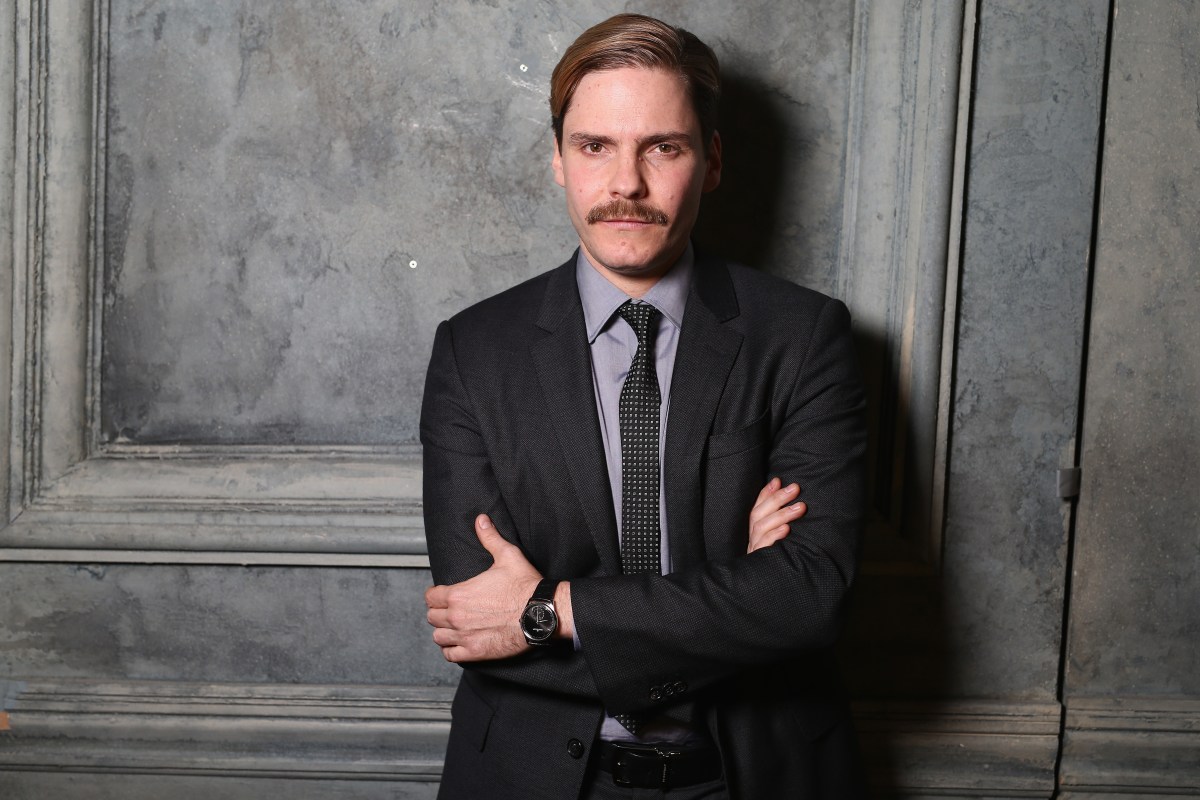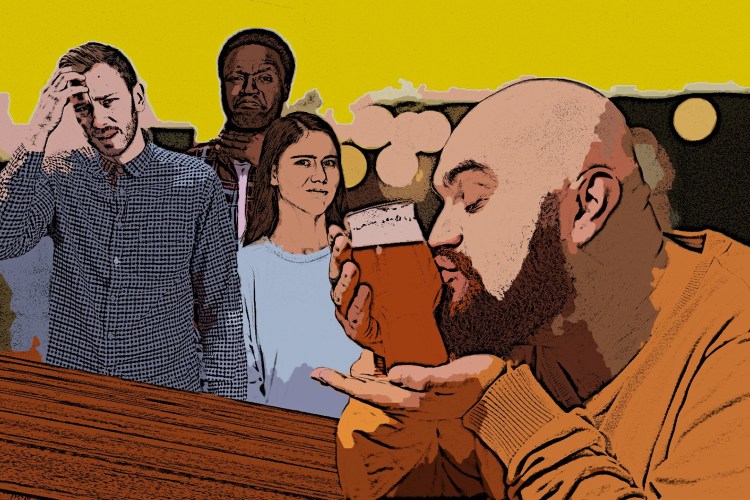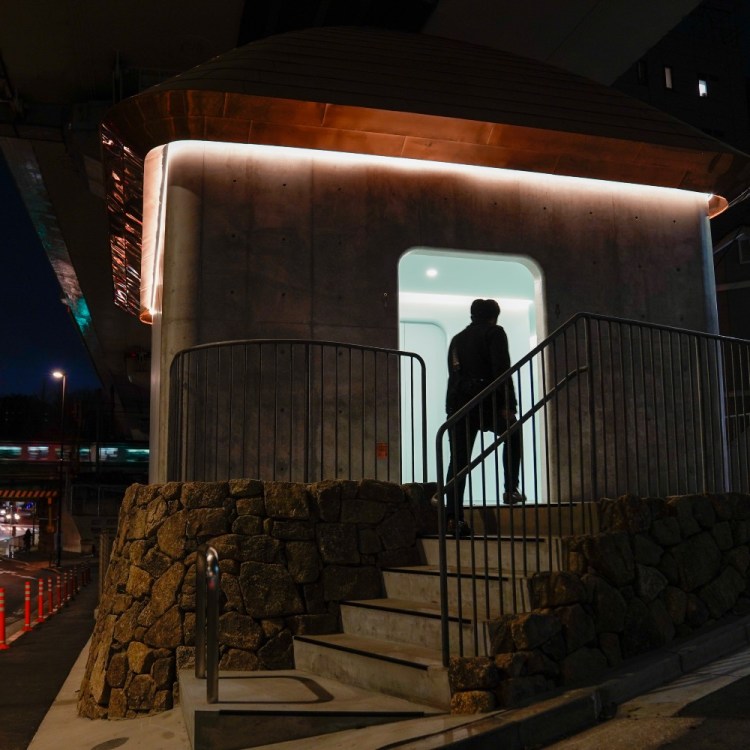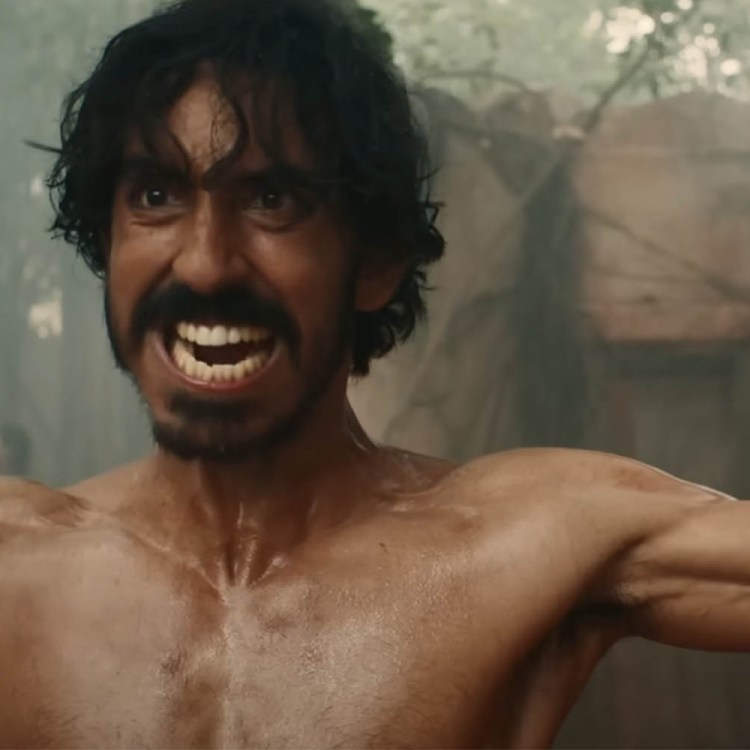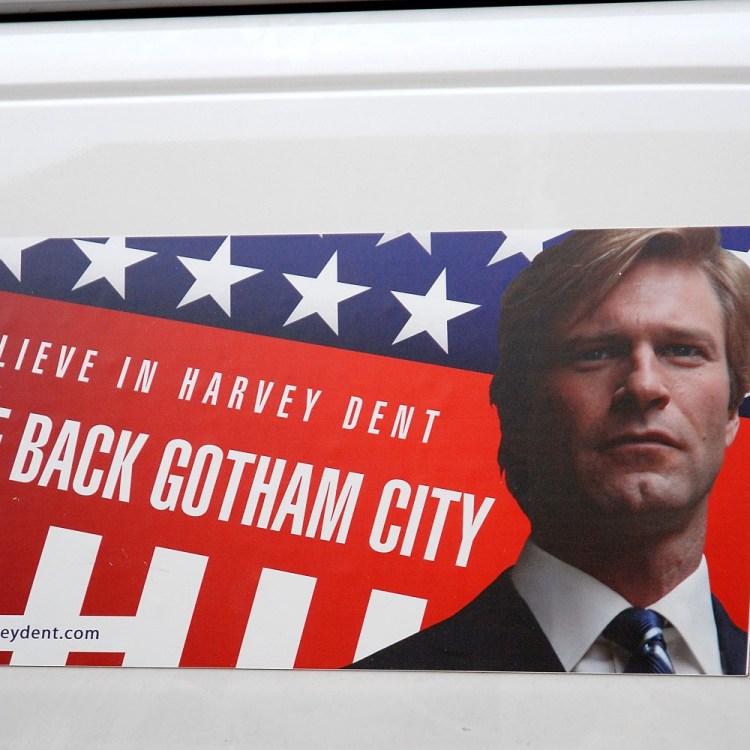It’s a dark twilight in Berlin (isn’t it always?) when I get summoned to meet Daniel Brühl, the star of the upcoming political thriller, 7 Days in Entebbe (which premiered at the Berlinale and opens March 16th). He’s also the title character in TNT’s addictive gloomier-than-thou series The Alienist. His publicist warned me that Brühl, 39, is hitting a wall after a long day of interviews. But the modest man I encounter inside the anonymous hotel room at the Grand Hyatt Berlin Potsdamer Platz is a pale, relatively shy bearded man weary of small-talk. It doesn’t take much to unearth his secret: he was up too late the night before at Bar Raval, the popular tapas joint he owns in the quirky Kreuzberg district also known as X-Berg.
“We had our big anniversary party,” Brühl confesses, “which is always during the Berlinale. So we always celebrate it and, as you can imagine, a long event.” He laughs and the wall appears to fall. “I’m only half Spanish, my partner is fully Spanish and so, the vibe is very Spanish and very alive and including drinks and chats and you know…”
He trails off but at some prodding about what he drank at his own personal bar he says, “I have loyal friends coming from Mexico who always bring us some wonderful tequila and then yesterday I decided not to touch the bottle of Mescal which apparently is a treasure that they found from some remote village in Mexico. With these guys, I always know that this is really good stuff but I said no, tomorrow’s an interview day so I will try it later this week.”
The gloom disappears. That Mescal bottle waits. Sometime in the future, there will be more celebration for the talented Barcelona-born actor who grew up in Cologne, Germany, the son of a Spanish mother and a German Brazilian father. His full name is Daniel Cesar Martin Brühl Gonzalez.
The multilingual actor–he speaks English, Spanish, German and French – broke out as the star of the 2003 international hit Goodbye, Lenin! after a stint on the German soap Verbotene Liebe (“Forbidden Love”). More recently in America, he had a hit opposite Chris Hemsworth playing Austrian Formula One champ Niki Lauda in Ron Howard’s car-racing film Rush for which he won a BAFTA; was the German war hero Frederik Zoller in Quentin Tarantino’s Inglorious Basterds with Brad Pitt; and entered the Marvel universe as supervillain Helmut Zemo in 2016’s Captain America: Civil War. Last year, he played Nazi Lutz Heck opposite Jessica Chastain in Niki Caro’s The Zookeeper’s Wife.
For all that, what really lights up Brühl’s whiskered face is discussing his restaurant-bar. “I wanted to have the tapas that my mother always did, so we’re talking about the basics that I always love and it can be pimientos and butter on a tortilla or tortilla de patatas all this– and a good ham.” He details the traditional dishes and those that they’ve updated with a twist. He confesses that, for him, it wasn’t that late at night: “Normally I’m the last man standing with a gin and tonic in my hands singing Spanish songs at 6:00 in the morning but yesterday I left at, I think, two AM and that was fine.”
The menu mixes old and new, which is also what appealed to him about his role as the impassioned German terrorist Wilfried Bose who, along with Brigitte Kuhlmann (Rosamund Pike) and two Palestinian terrorists hijacked Air France Flight 139 on route from Tel Aviv to Paris in the summer of 1976. Seeking ransom and the release of Palestinian and Pro-Palestinian prisoners (most detained in Israel), the hijackers forced the flight to land in Entebbe, Uganda. In response, the Israeli Defense Forces dispatched an elite counter-terrorism team to rescue the passengers on foreign soil and neutralize the hijackers. The role of the radical left-wing terrorist appealed to Brühl because of his interest in history. “A book that really opened my eyes was War and Peace but it was the first time that I understood there was no such thing as one history. There are different histories and different perspectives and this was one of these examples, which I found interesting because there are so many angles and so many points of view.”
For Brühl, understanding his radical character offers a key to “understanding where I am, in which world I’m living right now as a person if I’m looking back into tracing, tracing the chain links back in the ’70s, especially for my country, were a very significant generation.” His parents often discussed that era and his mother delivered Daniel in 1978.
“I grew up in a completely different generation,” Brühl explains intently, leaning in, “but I found that strong will and desire to fight against the shadows of the past — and that generation of Nazis who were still around in the German state– this rage and anger of the German generation completely understandable. And this is something that I also felt with the character I was playing here. His convictions and his motivations were clear to me.”
What drew Brühl toward the character was that he could identify with him even if he questioned his actions. “And yet because I’m not a radical person and I don’t have any sympathy for extremism and radical ideas, I found it interesting that this bourgeois man made this decision so that it wasn’t enough just to be a strong activist in the left scene in Germany but to do this– to go this extra step which also means that you probably will lose your life.”
Brazilian director Jose Padilha’s (TV’s Narcos) film appealed to Brühl because it examined this historical event from multiple perspectives: “A version in which these voices are heard, the German voices, the Palestinian voices — it was a history lesson for me to do this film and to read and dive into the material. To do a version in which it’s not a black and white picture and it’s not the cold-blooded inhuman terrorists versus the heroic soldiers from Israel. That wouldn’t have interested me.”
What particularly interested Bruhl was his character’s moral dilemma: “The crucial question is does that mission make sense, and is something that a left-wing terrorist coming from Germany can seriously be involved with: this is the question that was discussed in Germany in the ’70s. If they go as far as hijacking a plane with Jewish passengers in order to help the Palestinians,” doesn’t that perpetuate the cycle of violence and Jewish genocide. His character lives in doubt. It becomes increasingly difficult as he encounters real people at the other end of his gun. “It’s one thing to feel radically and think about an extreme mission and defend it – the other is to be surrounded by the real people, by a real woman with a number [tattooed] on her forearm. That is the crucial moment where my character is seriously troubled and questioning the whole mission.”
Troubling introspection is also characteristic of Brühl’s central role in the long-awaited adaptation of Caleb Carr’s historical thriller The Alienist, now unfurling on TNT. USA Today noted that the series’ success “stems mostly from Brühl. The wicked energy that served him so well as villains in films such as Captain America: Civil War bolsters his portrayal of Laszlo, a hero with darkness lurking just beneath his placid veneer.”
In this Sherlock on the Hudson set in Gilded Age Manhattan, Police Commissioner Theodore Roosevelt (Brian Geraghty) recruits Brühl’s criminal psychologist Dr. Laszlo Kreizler to solve the grisly serial murders of boy prostitutes, alongside Luke Evans’ posh, debauched illustrator John Moore and Dakota Fanning’s Vassar-educated police secretary Sara Howard. The ten-episode format – set to conclude on March 26 – allows the luxury of character development.
“It’s the first time I’m doing a show. So to spend so much time with a fascinating character is pure pleasure. And so that luxury of time is what attracted me to find the right show for me. Because, again, I’m a history expert and especially that time, at the beginning of so many sciences and so many interesting thoughts and new fields and all these guys who were pioneers in their own way. My wife is a psychologist so because of her I’ve been reading a lot of [Sigmund] Freud and [Carl] Jung and [Josef] Breuer.”
Dr. Kreizler’s jagged edges appealed to Brühl as much as the medical man’s search for knowledge. “He is a modern thinker and far too liberal for that time. It’s fascinating to read about Freud, Jung and Breuer who scared people and society because they were shaking everything up with their brave new ideas. It’s the same with Kreizler who is leaving the paths of medicine and knowledge and realizing this is just the beginning and you have to cross certain boundaries and moral limits in order to really help the mentally ill.”
The character, Brühl admits, is also more conservative than he thinks he is. And it’s this tension between psychological discovery in general and its impact on individuals unaccustomed to mental soul-searching that enriches the show. When Dr. Kreizler confronts Fanning’s secretary and asks socially inappropriate and incredibly personal questions about the impact of her late father’s death on her character, her shock registers and she strikes back.
Brühl explains, “Exactly because this was the Victorian age– the people were restrained to talk about their emotions and that wasn’t something that was socially common. We know how difficult it still is to look inside ourselves and how scary it is to see what we find once we dig. So it makes sense that people then must have been shocked for the first time when people after all these decades and centuries of stiffness and distance were peeling– were digging – inside the psyche. And I love playing those scenes with Dakota because of the way she looked at me and reacted and responded. What I also found interesting about the show is that he’s so brilliant and analyzing and destroying everyone around him but when it comes to himself….”
That’s the irony, the disconnect, that drives the show’s interpersonal conflict. As the team attempts to enter the killer’s mind they’re continually confronted by their individual fears and that complicates the search.
As Dr. Kreizler delves deeper, he becomes increasingly stressed and aggressive and vulnerable and fragile. As an actor, even with all his success, Brühl also still struggles with anxiety. “You would think that a certain routine sets in. I experience quite the opposite. I’m never fully happy with my performance. There are millions and trillions of details I would like to change.”
Putting himself under Kreizler’s microscope, Brühl confesses: “I can be quite anxious and dramatic. Dakota Fanning many times called me ‘drama queen.’ She’d say, ‘Stop being so serious, German.’”
Perhaps that’s why, in his adopted Berlin, Brühl relishes long nights of cocktails and singing with friends at his Bar Raval. This sense of up-all-night carousing is as much a German trait as a Spanish one for this actor infused by both traditions. In a city where East Germany meets west on cobbled streets, old bunkers sit side-by-side with sleek modern hotels, the past is never far away and the future is, at best, unsure. There’s only tonight, tapas and a different kind of Brühl, soulful and seeking — but not entirely serious.
This article was featured in the InsideHook newsletter. Sign up now.
